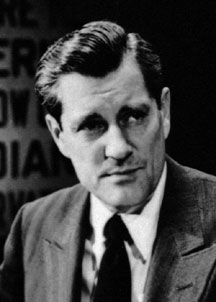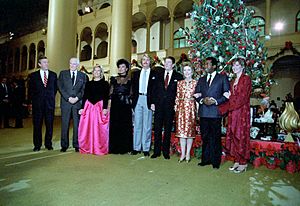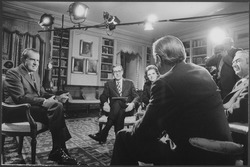Eric Sevareid facts for kids
Quick facts for kids
Eric Sevareid
|
|
|---|---|
 |
|
| Born |
Arnold Eric Sevareid
November 26, 1912 Velva, North Dakota, U.S.
|
| Died | July 9, 1992 (aged 79) Washington, D.C., U.S.
|
| Education | University of Minnesota (B.A. 1935) |
| Occupation | News journalist, author |
| Years active | 1930–1990 |
| Employer | CBS |
|
Notable work
|
Canoeing with the Cree (1935) |
| Television | CBS Evening News (1965–1977) |
| Spouse(s) |
Lois Finger
(m. 1935; div. 1962)Belén Marshall
(m. 1963; div. 1974)Suzanne St. Pierre
(m. 1979) |
| Children | 3 |
| Awards | Peabody Award (1950, 1964, 1968} Television Hall of Fame (1987} Emmy Award (1989} For More: See Honors |
Arnold Eric Sevareid (born November 26, 1912 – died July 9, 1992) was a famous American journalist and author. He worked for CBS News from 1939 to 1977. Eric Sevareid was part of a special group of war reporters known as "Murrow's Boys". These reporters were hired by the well-known CBS newsman Edward R. Murrow.
Sevareid was the first to report on the Fall of Paris in 1940. This happened when German forces took over the city during World War II. Later, he became a commentator on the CBS Evening News for 13 years. For his excellent work, he won several awards, including Emmy and Peabody Awards.
Contents
Early Life and Adventures
Eric Sevareid was born in Velva, North Dakota. His parents were Alfred Eric and Clara Pauline Elizabeth Sevareid. In 1925, his family moved to Minot after a bank failed. Later, they settled in Minneapolis, Minnesota.
He went to Central High School in Minneapolis. In 1935, he graduated from the University of Minnesota. Eric Sevareid had strong family roots in Norway and always felt connected to the country.
A Big Canoe Trip
Eric was very adventurous, even when he was young. In 1930, right after high school, he and his friend Walter Port went on an amazing canoe trip. The Minneapolis Star newspaper sponsored their journey. They canoed from Minneapolis all the way to York Factory on Hudson Bay.
This long trip covered about 2,250 miles (3,620 km). Eric wrote a book about this adventure called Canoeing with the Cree (1935). This book is still popular today!
Starting His Journalism Career
At 18, Eric Sevareid began his journalism career. He worked as a reporter for the Minneapolis Journal. At the same time, he was studying political science at the University of Minnesota.
He continued his studies and work abroad. First, he went to London, then to Paris. In Paris, he studied at the Sorbonne University. He also worked as an editor for United Press. Later, he became the city editor for the Paris Herald Tribune. Soon after, he joined CBS as a foreign correspondent in Paris.
Reporting from War Zones
Sevareid reported on the Fall of Paris in 1940. He followed the French government as it moved from Paris to Bordeaux and then to Vichy. After that, he left France for London and later Washington, D.C.. In July 1942, he became the head of the CBS Washington office.
He wrote about his early life and experiences in his book, Not So Wild A Dream (1946). This book shares stories about his childhood in Velva, his family, the canoe trip, and his experiences during World War II.
Reporting During World War II
Working with Edward Murrow
Eric Sevareid's work during World War II was very important for broadcasting. He was one of the first "Murrow's Boys" who worked with Edward R. Murrow. In 1940, he was the first to report on the Fall of France. Soon after, he joined Murrow to report on the Battle of Britain.
Sevareid often spoke fondly of his early days with Murrow. He said, "We were like a young band of brothers in those early radio days with Murrow." In his last broadcast for CBS in 1977, he even called Murrow the man who "invented me."
A Dangerous Rescue in Burma
On August 2, 1943, Sevareid was on a C-46 Commando plane. The plane was flying over Burma from Assam, India. It had engine trouble during a "Hump airlift" mission. Sevareid had to parachute out of the plane!
The U.S. Army Air Forces sent a search and rescue team. They found the group behind enemy lines and safely brought them back to India. John Paton Davies Jr., a U.S. diplomat who was also on the plane, helped lead the group to safety before the rescuers arrived.
Later Career at CBS
After the war, Eric Sevareid continued his work at CBS. He started his own program, Eric Sevareid and the News, in 1942. It was a short, five-minute show on Saturdays and Sundays. In 1946, he reported on the creation of the UN.
His book, Not So Wild a Dream, was reissued in 1976. Sevareid wrote that it was "good fortune to be a journalist in Washington, now the single news headquarters in the world since ancient Rome."
Even though he preferred writing, Sevareid worked a lot on television for CBS News. In the 1950s, he hosted Conquest, a science show. He also led the CBS Washington office from 1946 to 1954. He was one of the first to speak out against Joseph McCarthy's anti-communism methods.

European Correspondent
From 1959 to 1961, Sevareid was CBS's traveling European correspondent. He reported for CBS Reports. He also hosted several CBS series like Town Meeting of the World and The Great Challenge. Sevareid appeared in CBS's coverage of every presidential election from 1948 to 1976.
Interviewing Important People
One of Sevareid's big interviews was with Adlai Stevenson II in 1965, shortly before Stevenson passed away. This interview was published in Look magazine. However, it was his thoughtful "think-pieces" that made him famous worldwide.

CBS Evening News Commentator
On November 22, 1963, Sevareid joined Walter Cronkite on CBS television. He gave a commentary about the assassination of John F. Kennedy. He also spoke about what was next for the new president, Lyndon Johnson.
From 1964 until his retirement in 1977, Sevareid gave two-minute segments on the CBS Evening News. These segments were so well-known that his fans called him "The Grey Eminence." His commentaries won him both Emmy and Peabody Awards. In 1987, he was added to the Academy's Hall of Fame.
Sevareid's commentaries covered many important topics of the day. After a trip to South Vietnam in 1966, he suggested that continuing the war would be unwise. He thought the U.S. should try to find a peaceful solution. He also continued a CBS tradition of interview shows. On Conversations with Eric Sevareid, he interviewed famous people like West German Chancellor Willy Brandt.
Later, Sevareid narrated the American history series Between The Wars. In 1981, he hosted a documentary series on PBS called Enterprise. The next year, he hosted the newsmagazine show Eric Sevareid's Chronicle. He even made guest appearances as himself in the TV show Taxi (1980) and the movie The Right Stuff (1983).
Personal Life
Eric Sevareid married Lois Finger. They had twin sons, Peter and Michael. The boys were born in Paris while Eric was working there as a war correspondent.
His second marriage was to Belen Marshall. They had a daughter named Cristina. She was born in New York when Eric was working there.
Death
Eric Sevareid passed away from stomach cancer in Washington, D.C., on July 9, 1992. He was 79 years old.
Honors and Awards

Eric Sevareid received many honors for his work:
- 1950, 1964, 1976: Peabody Award
- 1954: Alfred I. duPont Award
- 1964: State of North Dakota Theodore Roosevelt Rough Rider Award
- 1965: New York Newspaper Guild Page One Award
- 1977: Paul White Award from the Radio Television Digital News Association
- Emmy Award winner:
- Best News Reporter or Commentator – 1955
- Best News Commentary – 1958
- 1993: He was added to the Scandinavian-American Hall of Fame after his death.
- On October 5, 2007, the United States Postal Service announced that Eric Sevareid would be honored with a first-class postage stamp. This stamp was issued on April 22, 2008, recognizing him as one of five important journalists of the 20th century.
See also
- Alfred and Clara Sevareid House
Books by Eric Sevareid
- Canoeing with the Cree, 1935
- Not So Wild a Dream (autobiography), 1946
- In One Ear: 107 Snapshots of Men and Events which Make a Far-Reaching Panorama of the American Situation at Mid-Century (essays), 1952.
- Small Sounds in the Night: A Collection of Capsule Commentaries on the American Scene, 1956.
- This is Eric Sevareid (essays), 1964.
- (With Robert A. Smith) Washington: Magnificent Capital, 1965.
- (With John Case) Enterprise: The Making of Business in America, 1983.

